Brideshead Revisited
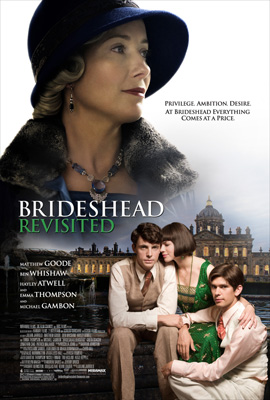
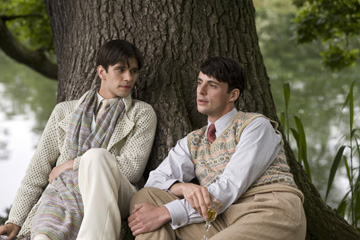 The film opens on a luxury cruise liner, where famed painted Charles Ryder (Matthew Goode) has a run-in with a woman from his past named Julia (Hayley Atwell). This causes Charles to think back to his days as a college student at Oxford, and brings us into the main story. As a student, he befriended a young man named Sebastian (Ben Whishaw). Despite the two coming from completely different worlds (Sebastian came from an upper class lifestyle with a strict Catholic upbringing, whereas Charles was middle class and atheist.), the two become very close, and Charles is invited to Sebastian's sprawling mansion home for the summer. It is there that Charles meets Sebastian's sister, Julia, for the first time. An affair between the two begins, much to the dismay of Sebastian, whom the movie not so subtlely hints may have stronger feelings for his friend than expected, and to their mother, Lady Marchmain (Emma Thompson), who looks down upon Charles' lack of religious faith and does not want her daughter to love him. The film follows the bizarre triangle between the three young friends, and the lengths that Charles will go to hold onto Julia.
The film opens on a luxury cruise liner, where famed painted Charles Ryder (Matthew Goode) has a run-in with a woman from his past named Julia (Hayley Atwell). This causes Charles to think back to his days as a college student at Oxford, and brings us into the main story. As a student, he befriended a young man named Sebastian (Ben Whishaw). Despite the two coming from completely different worlds (Sebastian came from an upper class lifestyle with a strict Catholic upbringing, whereas Charles was middle class and atheist.), the two become very close, and Charles is invited to Sebastian's sprawling mansion home for the summer. It is there that Charles meets Sebastian's sister, Julia, for the first time. An affair between the two begins, much to the dismay of Sebastian, whom the movie not so subtlely hints may have stronger feelings for his friend than expected, and to their mother, Lady Marchmain (Emma Thompson), who looks down upon Charles' lack of religious faith and does not want her daughter to love him. The film follows the bizarre triangle between the three young friends, and the lengths that Charles will go to hold onto Julia.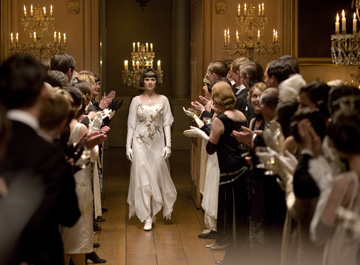 Brideshead Revisited would be a fairly ordinary story about class struggle (a topic that is all too common in British period piece dramas), but the film adds an interesting element with its theme of religious tension. This is a theme that carries through not just in the forbidden love story between Charles and Julia, but in other aspects of the plot and the lives of the characters. Charles is a man who sees that no good can come from religion. Not only does it forbid him from having Julia (at one point, Lady Marchmain tells him that she could forgive his social status if he were not an atheist), but he sees what it does to Sebastian, who is frequently drunk and wracked with guilt for his sins that his mother presses upon him daily. He drinks to escape the torment of his own sin, and finds himself spiraling down into self-destruction. Religion is something which Charles has a limited view of, and because of this, these experiences cloud his perception. He is not sure how to react to everything he sees around him.
Brideshead Revisited would be a fairly ordinary story about class struggle (a topic that is all too common in British period piece dramas), but the film adds an interesting element with its theme of religious tension. This is a theme that carries through not just in the forbidden love story between Charles and Julia, but in other aspects of the plot and the lives of the characters. Charles is a man who sees that no good can come from religion. Not only does it forbid him from having Julia (at one point, Lady Marchmain tells him that she could forgive his social status if he were not an atheist), but he sees what it does to Sebastian, who is frequently drunk and wracked with guilt for his sins that his mother presses upon him daily. He drinks to escape the torment of his own sin, and finds himself spiraling down into self-destruction. Religion is something which Charles has a limited view of, and because of this, these experiences cloud his perception. He is not sure how to react to everything he sees around him.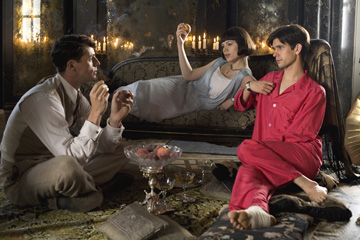 Although the film remains mainly faithful to the original novel by Evelyn Waugh, there is one particular aspect that seems to be highlighted much more here, and that is the relationship between Charles and Sebastian perhaps meaning a bit more than just friends. This part of their relationship, which was a mere undertone in the original story, has been brought into the center spotlight in this film, though in a way that the film is able to hold onto its PG-13 rating. This is obviously supposed to bring more tension in the triangle between Charles, Sebastian, and Julia, especially when Charles begins spending more time with Julia after they share a fling together in Venice. The problem is, the movie does not delve deep enough into the emotions of these characters. Charles' change of heart and focus seems merely a whim here, and we never quite get a sense as to what caused him to change his mind and go in another direction.
Although the film remains mainly faithful to the original novel by Evelyn Waugh, there is one particular aspect that seems to be highlighted much more here, and that is the relationship between Charles and Sebastian perhaps meaning a bit more than just friends. This part of their relationship, which was a mere undertone in the original story, has been brought into the center spotlight in this film, though in a way that the film is able to hold onto its PG-13 rating. This is obviously supposed to bring more tension in the triangle between Charles, Sebastian, and Julia, especially when Charles begins spending more time with Julia after they share a fling together in Venice. The problem is, the movie does not delve deep enough into the emotions of these characters. Charles' change of heart and focus seems merely a whim here, and we never quite get a sense as to what caused him to change his mind and go in another direction.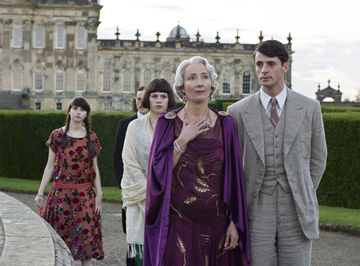 Though the filmmakers obviously attempted to squeeze as much of the story as they can into a limited space, this central problem comes back to haunt their good intentions frequently. Though handsomely shot and holding some good performances (none quite Oscar-worthy, however), the movie never quite connects on an emotional level as much as it should. Charles Ryder in particular comes across as a somewhat cold and calculating protagonist, whom we never quite get a good sense of. Matthew Goode plays him as somewhat of a blank slate, so we never quite know what he's thinking. The rest of the cast is excellent however, particularly Emma Thompson as the icy and manipulative mother of Sebastian and Julia. It's one of her better recent performances, and the one that winds up being the main stand out. Credit must also be given to the cinematography, especially the scenes set in the lovely Brideshead mansion home. This is a beautiful film to look at through and through.
Though the filmmakers obviously attempted to squeeze as much of the story as they can into a limited space, this central problem comes back to haunt their good intentions frequently. Though handsomely shot and holding some good performances (none quite Oscar-worthy, however), the movie never quite connects on an emotional level as much as it should. Charles Ryder in particular comes across as a somewhat cold and calculating protagonist, whom we never quite get a good sense of. Matthew Goode plays him as somewhat of a blank slate, so we never quite know what he's thinking. The rest of the cast is excellent however, particularly Emma Thompson as the icy and manipulative mother of Sebastian and Julia. It's one of her better recent performances, and the one that winds up being the main stand out. Credit must also be given to the cinematography, especially the scenes set in the lovely Brideshead mansion home. This is a beautiful film to look at through and through.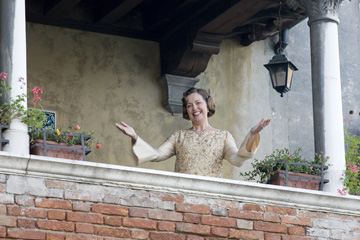
See the movie times in your area or buy the DVD at Amazon.com!






0 Comments:
Post a Comment
<< Home